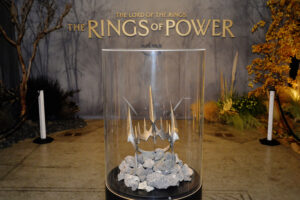
SAN DIEGO, CALIFORNIA – JULY 25: View of costume display during The Lord Of The Rings: The Rings Of Power SDCC Press Preview Event at Venue 808 on July 25, 2024 in San Diego, California. (Photo by Jerod Harris/Getty Images for Amazon MGM Studios)
The following review is a reflection on Lord of the Rings: Rings of Power Season 2 episodes 1-3 on Prime Video. The opinions shared are those of the writer and do not necessarily reflect those of the publisher. You can stream Rings of Power on Prime Video.
I am a huge Tolkien nerd. After I dipped my toes into the fandom briefly when I was 8 and 12, the Peter Jackson movies came out when I was in high school and it became my thing. I doodled messages using Tolkien’s invented alphabets. I wrote fanfiction. I wore costumes. In recently years, I’ve even given lectures teaching Elvish. I’m in this for the long haul. I deeply love the things that Tolkien deeply loved: trees, languages, and a yearning for that better place of legend somewhere across the water (whether the Western Ocean or the River Jordan). I often wonder if that is why the Rings of Power showrunners are in it. Are they telling us these stories, using Tolkien’s world and characters, because they love them deeply? There is much to discuss in and about Middle-earth. What questions will the showrunners pose? What stories will they tell?
The first three episodes of The Rings of Power’s second season follow returning characters from all the different races of Middle-earth as they explore the dangers and mysteries the previous season left them with.
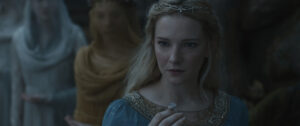
Morfydd Clark as Galadriel
The Elves:
Three Rings of Power have been made. Now, the Elves face a moral quandary. Do they use a tool that might have been corrupted by the enemy, a tool by which he could possibly corrupt them? Elrond would not. He would let the Elves fall before chancing corruption. Satan has touched so many things in this fallen world. So often we think we see him in something new, but is that true or just our fear talking? When jazz was new, it was “the devil’s own music.” Lightning rods were once thought to be satanic. Lightning bolts were obviously the finger of God’s wrath, and who were we to try to divert that wrath from its intended target? Time has proven that thought to be folly rather than wisdom. Other actions and systems are still up for debate in many circles. Is astrology inherently corrupt and corrupting? Is drinking? Is politics? Paul tells us that all things are permissible, but not all things are beneficial.
Elrond, Galadriel, Círdan, and Gil-galad have their only own ancient wisdom to cling to. Hopefully they will truly, vulnerably listen to one another. We see Galadriel come around to embracing the wisdom of Gil-galad, even though it means admitting her own weakness. Hopefully she will also take Elrond’s wisdom to heart when her time comes to face Sauron again. To whom do you turn for wisdom? Our own community of faith includes those in the pew next to us each Sunday, the church universal, and the great cloud of witnesses from all ages past. The powerful tools of Scripture and prayer also help us toward wisdom when used wisely themselves.
Celebrimbor, however, is isolated from the other elves. When Sauron (still disguised as the man Halbrand) arrives, he talks his way back into Celebrimbor’s good graces. Sauron, like our real enemy, is a deceiver. He understands what drives people in their hearts. Rather than choosing to use this empathy for good, Sauron uses it to gain power over others. He plays on Celebrimbor’s vanity and fear. Celebrimbor fears being forgotten, since he is a smith and not a king. The elf fears living forever in the shadow of his grandfather’s artistic legacy. Sauron commiserates with him about how artists are so often forgotten, and promises him the chance to do even greater things. If only Celebrimbor would recognize those “greater things” Sauron guides him toward are only in service to the deceiver himself! Alternatively, we see the kinds of work Celebrimbor does apart from evil guidance. He makes ithildin, a magical metal that is invisible except by the light of the moon. It is mysterious and beautiful, a marvel in its own right. But it will not grant Celebrimbor power, so he dismisses it in lieu of making more rings.
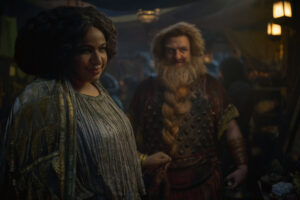
Sophia Nomvete as Disa; Owain Arthur as Prince Durin IV
The Dwarves:
The Dwarves of Khazad-dûm are as stubborn as the stones that surround them. An argument at the end of the previous season has left King Durin III and his son Prince Durin IV estranged. The prince’s wife Disa gives both Durins earfuls trying to persuade them to talk to each other. Even if Prince Durin was less incorrect in the original offence, Disa points out that he is in the wrong now, for letting this argument go on for so long. When King Durin calls his stubbornness strength, she agrees: “I imagine it does take strength to carry a grudge so heavy, to keep your wounded heart so tightly bound it can barely beat.”[1] No wonder Khazad-dûm feels some seismic activity in these early episodes, with Disa dropping so many truth bombs.
The Númenorean Men:
In the 1950s, Tolkien tried his hand at writing a sequel to The Lord of the Rings. Set one hundred years after the War of the Ring, the Men of Gondor faced a rising undercurrent of unrest as some men tired of doing good. There was to be a plot to supplant the king, which the good guys would need to foil. Tolkien said it could have been quite a “thriller,” and therefore “not worth doing.” He knew the kind of story it would have turned out to be and consciously decided not to include it in Middle-earth.[2]
Now we have the Númenorean storyline in The Rings of Power. We see quite the political intrigue as Pharazôn positions himself opposite his cousin, Queen Regent Míriel. Their positions are not clear, though, except that Míriel is a traditionalist while Pharazôn wishes to make a new Númenor. But what traditions is she actually upholding? What traditions does Pharazôn want to subvert? Tolkien’s Númenoreans might have done better to neglect a few traditions, but Míriel is the one shown sympathetically. Pharazôn seems to be able to get Míriel to do what he wants most of the time, so why the subterfuge? Amid this confusion, episode three climaxes with a political stunt Pharazôn set up with his supporters to make Míriel seem weak and duplicitous. I’m sure this season’s story of Númenorean politics will prove to be quite the thriller. And therefore, a story that wasn’t really worth doing.
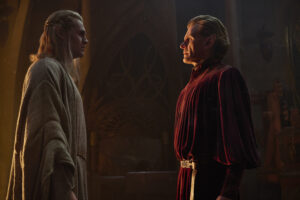
Charlie Vickers as Annatar; Charles Edwards as Celebrimbor
The Bad Guys:
The first episode’s prologue shows us how Sauron could’ve chosen to do good and to be good. He had that choice every day. This is a good lesson, but I am suspicious of the showrunners. No one watching thinks Sauron will be good. Why did they spend so much time showing us he definitely chose to be evil? Will they waste time exploring this further this season, or was it just to answer a lingering doubt from season one?
Perhaps they linger on this aspect of Sauron’s story to tie it back to Galadriel’s. After all, we shouldn’t apply this lesson only to our enemies. Elrond questions Galadriel along similar lines: she has rejected glorious light before; is there darkness in her heart? Just as any person of great evil could any day decide to do good, any day any good person could decide to do evil.
The show most deeply misses the point of Tolkien by indulging in a morbid fascination with evil. Isildur’s escape from the evils of the “Black Forest” is at least more Tolkienesque, as he is fighting giant spiders (a staple of Middle-earth evil). Outside that sequence, though, there’s so much blood and gore. Black-worm-blob-Sauron is an excellent visualization of evil. So excellent I will have nightmares for days. The camera lingers on a sea monster, a warg, orcs stabbing things and being stabbed; so much time is spent on monsters. Just to marvel at it being wicked cool and gross. Tolkien is about marveling at the simple beauty of nature or the angelic beauty of elves. The first episode has no joy, nor love of beauty in it at all. Except briefly with Nori and the Stranger.
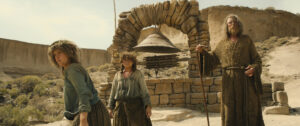
Markella Kavenagh as Nori; Megan Richards as Poppy; Daniel Weyman as The Stranger
The Stranger:
One reason Tolkien did not pursue publication of The Silmarillion in his lifetime was that there were no hobbits. Hobbits are the audience-insert characters, the ones that keep the story grounded. The Silmarillion has been called the “Old Testament” of Middle-earth. For indeed, without hobbits—lo!—Tolkien’s prose abounds with thees and thous, begetting and forswearing, and everything has the cadence of King James’ English. He soars into the high beauty of the elves, neglecting his equal love for natural landscapes and plain simple country-folk. Likewise, the show gets wound up in its own drama, mystery, and exploration of evil, until it remembers the Harfoots (Harfeet?) and the Stranger they have befriended.
The Stranger struggles to remember or figure out who he is and what he is here for. He misses a home he can’t remember, one that’s “just beyond the sunset,”[3] and so do we all who sojourn here, strangers in this land when our citizenship in heaven. He does not remember his name, but he knows he already has one. That name is already part of him, even if he has forgotten it. He will not let even Nori give him something so powerful as a name. He will wait and search for that power within himself (he knows it’s there somewhere!), rather than let someone else override it. Nori’s solution to the problem is simple, easy, and good-natured; she wants to help her friend. But if the Stranger accepted Nori’s name for him, it would be a rejection of his true potential. Friends can indeed help us remember who we are when we forget, but don’t let even your friends decide who you are for you, when neither of you know for sure.
Final thought:
Providence is a great theme in The Lord of the Rings, but will it be in this show? Sauron just happens to meet a kind old man. Then he just happens to meet Galadriel. Círdan just happens to glimpse the Rings because a wave just happens to startle him. Will we see that these “coincidences” were the providential work of the Valar, those angelic servants of Ilúvatar All-Father? Will we see how the millennia-long arc of Elven history bends toward justice?
[1] Rings of Power, episode 2.2, “Where the Stars are Strange.”
[2] J.R.R. Tolkien, “The New Shadow,” ch. 16 of The Peoples of Middle-earth. The History of Middle-earth, vol. 12. Christopher Tolkien, ed.
[3] Rings of Power, episode 2.3, “The Eagle and the Sceptre.”
